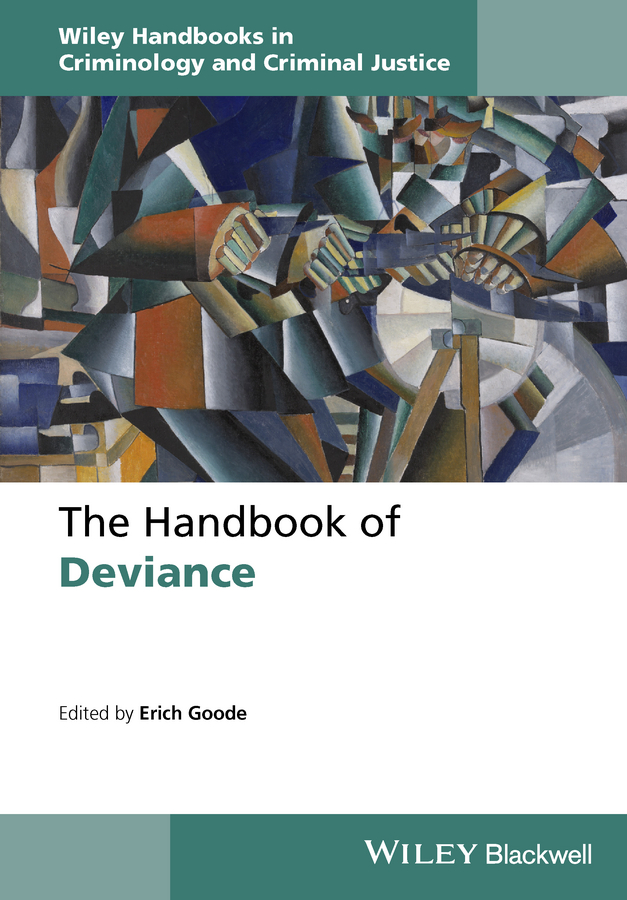Электронная книга: Erich Goode «The Handbook of Deviance»

|
The Handbook of Deviance is a definitive reference for professionals, researchers, and students that provides a comprehensive and engaging introduction to the sociology of deviance. Composed of over 30 essays written by an international array of scholars and meticulously edited by one of the best known authorities on the study of deviance Features chapters on cutting-edge topics, such as terrorism and environmental degradation as forms of deviance Each chapter includes a critical review of what is known about the topic, the current status of the topic, and insights about the future of the topic Covers recent theoretical innovations in the field, including the distinction between positivist and constructionist perspectives on deviance, and the incorporation of physical appearance as a form of deviance Издательство: "John Wiley&Sons Limited"
ISBN: 9781118701324 электронная книга Купить за 15057.96 руб и скачать на Litres |
Erich Goode
Erich Goode is an American
Erich Goode received a B.A. from
Goode takes a
As a sociologist, Goode makes no judgment about whether a particular is "bad" or "evil", and considers deviance as a topic to be entirely dependent on whether the society at large considers the behavior deviant. In this view, a particular behavior can be deviant in one society, but normal in another. This is in contrast to the perspective of
According to the constructionist framework as espoused by Goode, an instance of "deviance" can exist as a social construct exclusively, completely separate from any actual behavior. In other words, "imaginary deviance" can exist that causes a frenzy of interesting sociological behavior in response to a non-existence phenomenon.
Goode's Four Types of Drug Use
Books
In "The Marijuana Smokers" [http://www.druglibrary.org/special/goode/mjsmokers.htm] , Goode looked at marijuana through a sociological lens.
In "Drugs in American Society", Goode argued that the effect of a drug is dependent on the societal context in which it is taken. Thus, in one society (or social context) a particular drug may be a depressant, and in another it may be a stimulant.
"Deviant Behavior" is a textbook intended for undergrad students. In it, Good takes the position of a weak constructionist.
"Moral Panics: The Social Construction of Deviance", written with Nachman Ben-Yehuda, is a book about moral panics, from a sociological perspective.
In "Paranormal Beliefs: A Sociological Introduction", Goode studies paranormal beliefs such as
Controversy
As a sociologist, Goode relies heavily on informants for his research. For example, Goode consulted with and interviewed actual drug users for his books on drugs. In 1999, Goode admitted through the sociology journal circuit that he had engaged in sexual intercourse with many of his deviant informants, and discussed how this influenced his perspective on the subject he was studying. This caused a firestorm of articles defending or denouncing his work [http://www.ingentaconnect.com/content/routledg/udbh/1999/00000020/00000004/art00001] [http://www.ischool.utexas.edu/~kleinman/Goode_OhLord.pdf] .
References
Источник: Erich Goode
Другие книги схожей тематики:
| Автор | Книга | Описание | Год | Цена | Тип книги |
|---|---|---|---|---|---|
| Erich Goode | The Handbook of Deviance | The Handbook of Deviance is a definitive reference for professionals, researchers, and students that provides a comprehensive and engaging introduction to the sociology of deviance. Composed of over… — John Wiley&Sons Limited, электронная книга Подробнее... | 15057.96 | электронная книга |
См. также в других словарях:
The Division of Labour in Society — Cover of the French edition of the Division of Labor in Society … Wikipedia
motion picture, history of the — Introduction history of the medium from the 19th century to the present. Early years, 1830–1910 Origins The illusion of motion pictures is based on the optical phenomena known as persistence of vision and the phi phenomenon. The first … Universalium
Political abuse of psychiatry in the Soviet Union — Soviet Union … Wikipedia
National Deviancy Symposium — The National Deviancy Symposium (or National Deviancy Conference) consisted of a group of British Criminologists dissatisfied with Orthodox British Criminology, many of them later involved with Critical criminology and/or Left realism. According… … Wikipedia
Sociology — For the journal, see Sociology (journal). Sociology … Wikipedia
Structural functionalism — Sociology … Wikipedia
